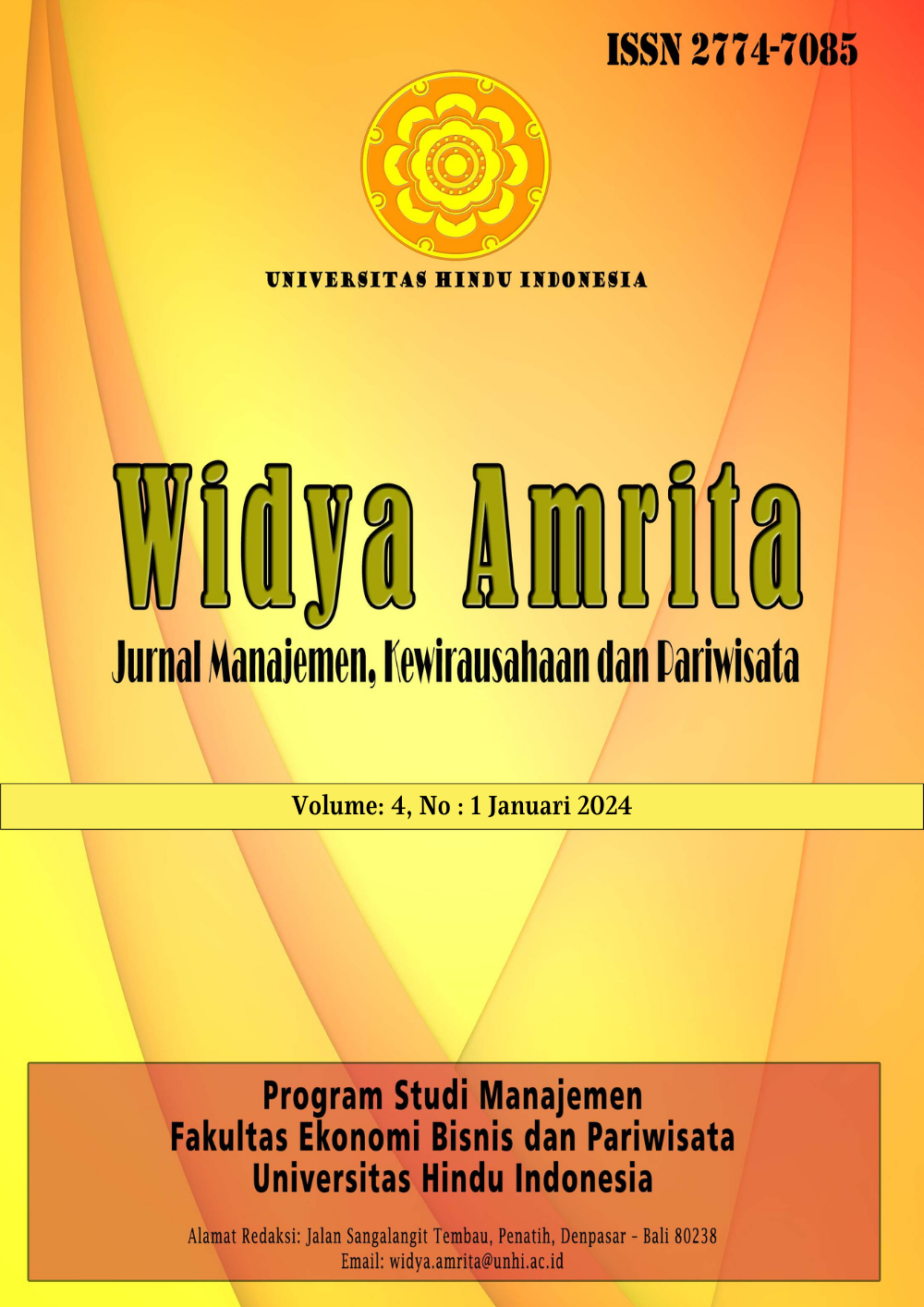Faktor-Faktor yang dapat Menurunkan Turnover Intention Karyawan
Abstract
High employee turnover rates can reduce company productivity. Companies must always try to minimize every factor that can increase their turnover rate in them. The purpose of this study was to determine the partial and simultaneous effect of job attachment, organizational justice, and job satisfaction on turnover intention (a study of back office employees at PT. Mutiara Dewata Jaya). Data collection was carried out using observation, interviews, documentation, literature studies, and questionnaires. The population in this study were all back office employees at PT. Mutiara Dewata Jaya as many as 55 people, all of whom were used as research samples. This study used data analysis techniques, namely the research instrument test, classical assumption test, multiple linear regression analysis, coefficient of determination test, t-test, and F test. The results showed that, partially and simultaneously, job attachment, organizational justice, and job satisfaction have a negative effect and are significant on turnover intention.
References
Afandi, P. (2018). Manajemen sumber daya manusia (Teori, konsep dan indikator). Riau: Zanafa Publishing.
Agustini, N. L. P. T. Y., & Subudi, M. (2018). Pengaruh Kepuasan Kerja, Keadilan Organisasional dan Komitmen Organisasional terhadap Turnover Intention Karyawan. E-Jurnal Manajemen Unud, 7(12), 6703–6730. https://doi.org/10.24843/EJMUNUD.2018.v7.i12.p12
Andini, R. (2006). Analisis pengaruh kepuasan gaji, kepuasan kerja, komitmen organisasional terhadap turnover intention (studi kasus pada rumah sakit roemani muhammadiyah semarang). Universitas Diponegoro.
Badriyah, M. (2015). Manajemen sumber daya manusia (1st ed.). Bandung: CV Pustaka Setia.
Crossley, C. D., Bennett, R. J., Jex, S. M., & Burnfield, J. L. (2007). Development of a global measure of job embeddedness and integration into a traditional model of voluntary turnover. Journal of Applied Psychology, 92(4), 1031–1042. https://doi.org/10.1037/0021-9010.92.4.1031
Hiariey, H., Attamimi, R., & Salmon, J. (2022). Job Embeddeness dan Organizational Citizenship Behavior Pengaruhnya terhadap Turnover Intention. Jurnal Pendidikan Tambusai, 6(2), 9231–9238. https://doi.org/10.31004/jptam.v6i2.3872
Hutagalung, I. D. N., & Wibawa, I. M. A. (2017). Pengaruh keadilan organisasional terhadap komitmen organisasional dan turnover intention karyawan pada PT. Bank Rakyat Indonesia. E-Jurnal Manajemen Unud, 7(1), 221–250. https://doi.org/10.24843/EJMUNUD.2018.v7.i01.p09
Mahayasa, I. G. A., Putra, I. G. N. A., & Oktarini, L. N. (2023). Analisis pengaruh budaya organisasi dan kepuasan kerja terhadap turnover intention karyawan (Studi Pada Green Terrace Tegallalang, Gianyar-Bali). Implementasi Manajemen & Kewirausahaan, 3(2), 16-28.
Mahdi, A. F., Zin, M. Z. M., Nor, M. R. M., Sakat, A. A., & Naim, A. S. A. (2012). The relationship between job satisfaction and turnover intention. American Journal of Applied Sciences, 9(9), 1518–1526.
Mitchell, T. R., Holtom, B. C., Lee, T. W., Sablynski, C. J., & Erez, M. (2001). Why people stay: Using job embeddedness to predict voluntary turnover. Academy of Management Journal, 44(6), 1102–1121. https://doi.org/10.5465/3069391
Monika, S. R., & Nurmaya, E. (2021). Pengaruh job embeddedness, organizational commitment, dan self-efficacy terhadap turnover intention karyawan pada PT. PLN (Persero) UP3 Yogyakarta. INOBIS: Jurnal Inovasi Bisnis Dan Manajemen Indonesia, 4(4), 482–493. https://doi.org/10.31842/jurnalinobis.v4i4.199
Prameswari, N. K. S., & Suwandana, I. G. M. (2017). Pengaruh Keadilan Organisasional, Komitmen Organisasional, Dan Kepuasan Kerja Terhadap Organizational Citizenship Behavior. E-Jurnal Manajemen Unud, 6(3), 1368–1397.
Rarasanti, I. A. P., & Suana, I. W. (2016). Pengaruh Job Embeddedness, Kepuasan Kerja, dan Komitmen Organisasional Terhadap Turnover Intention Karyawan. E-Jurnal Manajemen Unud, 5(7), 4690–4718.
Riantini, N. L. E., Suartina, I. W., & Mahayasa, I. G. A. (2021). Pengaruh Pengembangan Karir Dan Job Insecurity Terhadap Turnover Intention. Journal of Applied Management Studies, 2(2), 79-90.
Singh, J., Verbeke, W., & Rhoads, G. K. (1996). Do organizational practices matter in role stress processes? A study of direct and moderating effects for marketing-oriented boundary spanners. Journal of Marketing, 60(3), 69–86. https://doi.org/10.1177/002224299606000305
Sutanto, E. M., & Gunawan, C. (2013). Kepuasan kerja, komitmen organisasional dan turnover intentions. Jurnal Mitra Ekonomi Dan Manajemen Bisnis, 4(1), 76–88.
Utomo, K. H., & Prasetio, A. P. (2018). Pengaruh Kepuasan Kerja Terhadap Turnover Intention (Studi pada PT Kawan Lama DC Jabebaka Cikarang). ISEI Business and Management Review, 2(2), 5–12. https://doi.org/10.36217/ibmr.v2i2.66
Wedantha, I. B., & Supartha, W. G. (2016). pengaruh keadilan organisasi terhadap kepuasan kerja dan turnover intention pada karyawan Oberoi hotel Bali. E-Jurnal Manajemen Unud, 5(10), 6288–6316.
Widyanti, N. L. T., & Agustina, M. D. (2021). Pengaruh Kepuasan Kerja Dan Komitmen Organisasi Terhadap Turnover Intention. Jurnal Manajemen, Kewirausahaan Dan Pariwisata, 2(1), 33–45. https://doi.org/10.32795/widyaamrita.v2i1.1747
Wisnawa, I. G. Y. C., & Dewi, A. A. S. K. (2017). Pengaruh Keadilan Organisasional Terhadap Kepuasan Kerja Dan Keinginan Keluar Karyawan Kontraktual Pada Pt Indomarco Prismatama Badung Bali. E-Jurnal Manajemen Unud, 6(10), 5636–5659.








